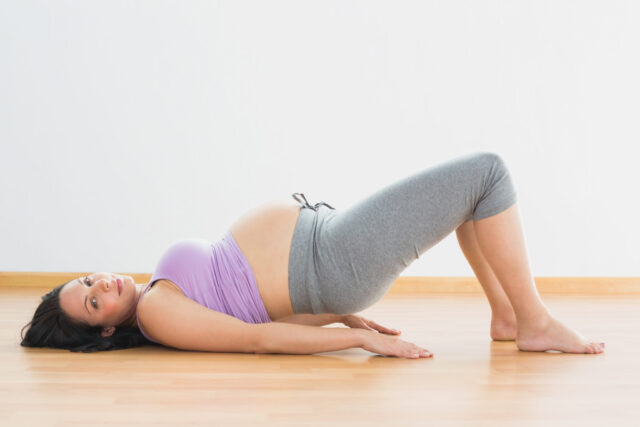Pelvic Floor Therapy: A Postpartum Must
I cannot overstate how unrealistic my expectations about my postpartum body were. I gave birth to my son in January and expected to run a half marathon in April and to be ready for a full marathon by the fall. Spoiler alert: that didn’t happen (although I’m sure for some women that is possible). I knew running would be different and probably challenging, but I didn’t know it would be so very different.
I also didn’t know I would still be peeing my pants.
Prior to pregnancy, I could drink a bottle of water before going on a run and not worry about stopping to use the bathroom. Prior to pregnancy, I never had to worry about peeing when I laughed or sneezed. I assumed that once the baby pressing on my bladder was no longer there these issues would resolve themselves.
They didn’t.
I was frustrated and didn’t understand. I was healthy. I was active. From a medical standpoint, the birth of my son went as smooth as can be. No major tearing or issues. Yet, my body wasn’t doing the things I thought it should be.
Then, I learned about pelvic floor therapy and was pointed in the direction of a wonderful pelvic floor therapist.
I don’t remember hearing the term “pelvic floor” before having my son. If I did, I certainly did not understand the importance of it. It makes sense though. A baby’s head shoved my muscles and ligaments (i.e. my pelvic floor) out of the way to come into this world. It causes some damage that varies for everyone. For me, it was peeing at times I definitely did not want to pee. For some women, it’s incontinence. For others, pain with sex.
I saw my pelvic floor PT for the first time at a little over 4 months postpartum, weeks after I had been “cleared” by my doctor. I had been attempting to live my life “business as usual”, but it wasn’t business as usual.
For whatever reason, pelvic floor therapy is not widely known or available. I didn’t even know it was an option after I had my son and didn’t inquire about it at my 6-week check-up. I thought time and some good ole fashion kegels would be all the healing I needed. It isn’t, and actual physical therapy for the pelvic floor requires so much more than just kegels.
We worked on my core, my hip mobility, my glutes. We looked at my posture while I held and nursed my baby. We focused on retraining muscles that were so out of whack from 9 months of pregnancy and birth. Slowly, things started to feel better.
Like my unrealistic expectations of my postpartum body, I’ll admit I developed the unrealistic expectation that a pelvic floor therapist would get me back to the body I had before having a baby. Again, that wasn’t quite the case.
Working with my PT, however, I realized my new reality: my body was different, and there are parts that may always be different. She helped me understand my new body, appreciate my new body, and get to a place where my new body didn’t pee while out for a run.
AUTHOR’S NOTE: Unfortunately, pelvic floor therapy is not in everyone’s budget/included with their insurance plan. However, there are a ton of free resources out there. I strongly encourage any woman wanting to learn more about their pelvic floor and pelvic floor therapy to check out the following accounts on Instagram:
- @empower.your.pelvis
- @thevaginawhisper
- @fem.unfolding


I’ve been quite impressed by the MuTu exercise program, which was specially developed to help with diastasis recti and/or pelvic floor disfunction/weakness after having given birth. (I am not associated with the MuTu exercise program in any way, so I won’t benefit by this comment.) If you’re looking for help after having children, it doesn’t cost anything to check it out, and it does go on sale around Black Friday and the 5th, 6th, or 7th of July (Wendy’s birthday sale). For a detailed review of it, google “Like Mother, Like Daughter MuTu.” I’m not associated with the Like Mother, Like Daughter blog, either, but the review is quite informative.
Great feedback for our mamas seeking accessible resources. Thank you!
I’m starting my physical therapy this week! I’m actually really nervous about it. My insurance doesn’t cover it so I’ll be paying out of pocket and I’m just worried it won’t work or it will take so long, I won’t be able to afford to keep doing it. It helps to know that I’m not alone, though! I fully expected to be able to keep running postpartum, as I had kept running almost all the way through my pregnancy. I knew some women who said they peed a little when they sneezed, etc., but I never expected the total lack of control over my bladder that I experienced. I really hope the PT helps!